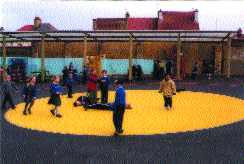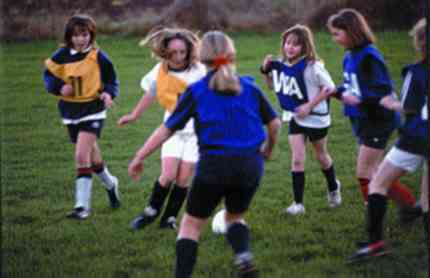|
The area
outside the primary classroom is already much used as an extension
to the class base and there have been exciting uses made of primary
school grounds for learning, whether as planted areas or large scale
learning experiences. At secondary level this area of experience
has been neglected with the possible exception of using external
hard-surfaced areas for some practical work.
Whatever the age group, it is useful to provide some areas that
are sheltered from the weather. Security must also be considered,
particularly for the under fives.
Sports
facilities
Minimum areas for playing fields on which team games can take place
are set out in the Education (School Premises) Regulations (1999).
Areas are based on the numbers of pupils at the school and their
ages, but only apply to schools which have pupils over the age of
eight. Where playing fields are grassed, they must be capable of
sustaining at least seven hours a week of games. Some types of all-weather
surfaces, such as hard porous, synthetic and polymeric surfaces,
can be counted as twice their actual area for the purposes of the
regulations.
A school of the future may have more generous provision to encourage
greater participation in sport at all ages and to cater for increased
out of hours and community use. Both grassed and hard surfaced areas
are needed to ensure a range of skills can be developed. Playing
fields must be able to sustain the impact of much more than seven
hours a week usage if they are to benefit participants of all ages.
This points to an increasing provision of all-weather pitches and
running tracks, matched where appropriate with floodlighting
|


(see
Building Bulletin 85 for information on the sizes of pitches and
tracks). Provision for the performing arts may also be considered
as a part of the school landscape. This could also function as a
social space.
Recreation
areas
Recreation areas are an important part of any school. In urban areas,
the school grounds may be a pupil's main experience of outside space.
These areas should be attractively designed and full of variety
of space. Some people will want quiet enclosed places for contemplation
or talking with friends. Some will want open spaces where they can
run about or play team games. Outside areas can also provide alternative
places to eat in fine weather. Pupils with SEN have particular access
and sensory needs (see Building Bulletin 94). There should be some
shelter from the weather.
|
In
the future schools may have more generous playing-field provision
to encourage participation across a range of users
WESTBOROUGH PRIMARY SCHOOL, Westcliff-on-Sea, Essex; Recreation areas
should include a variety of spaces for different activities.
|

